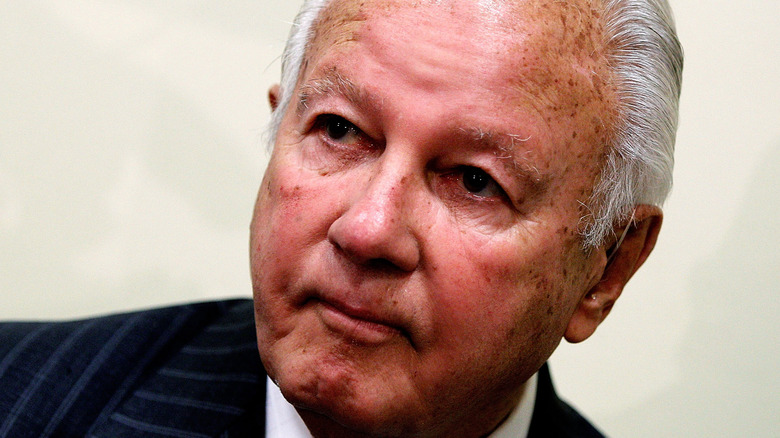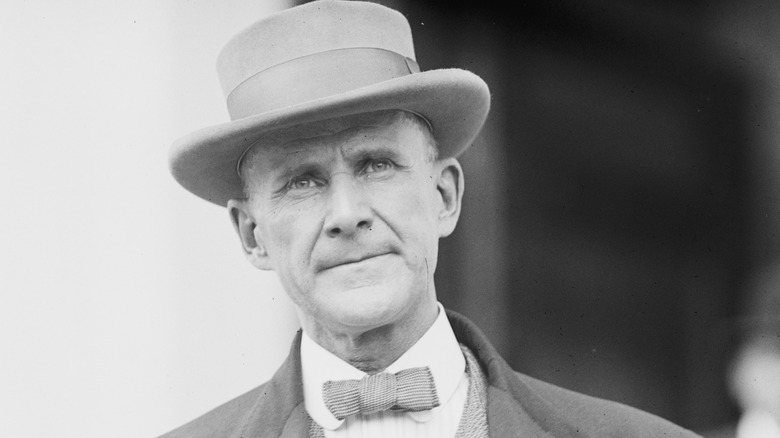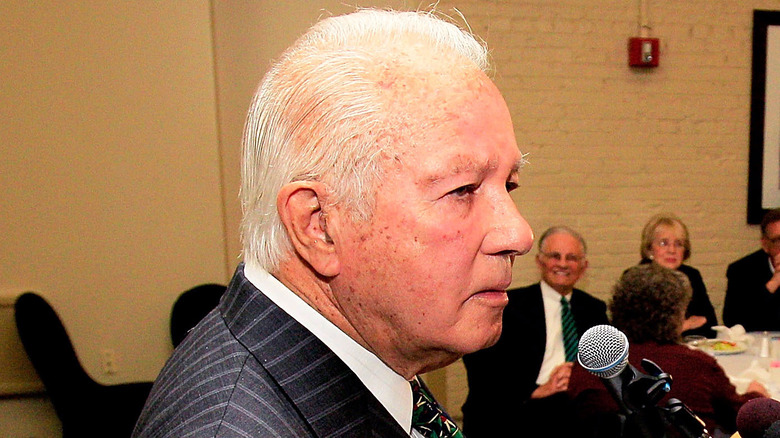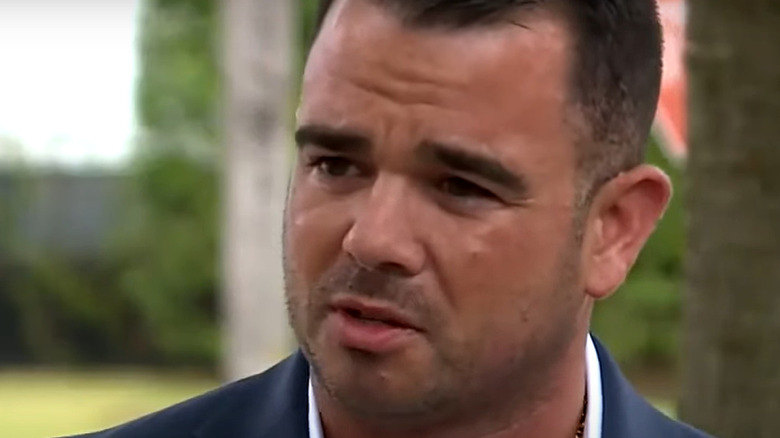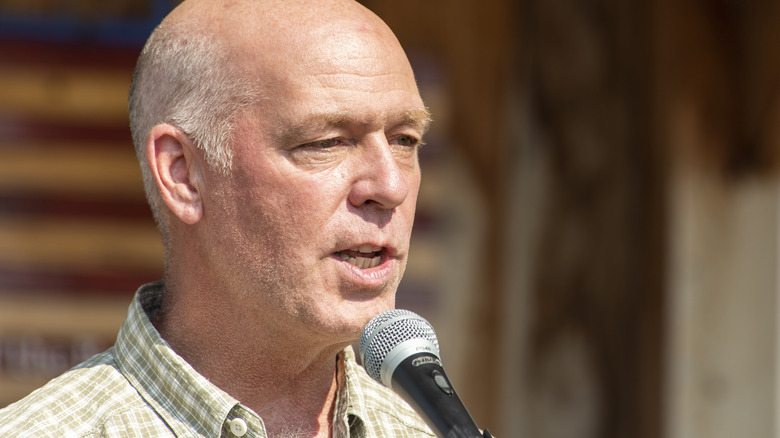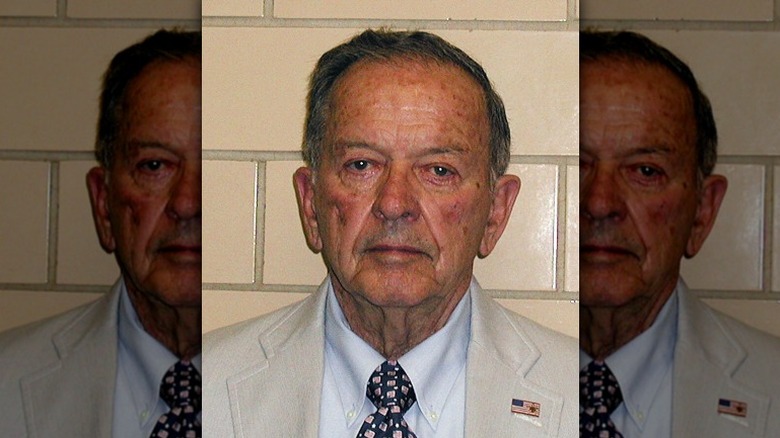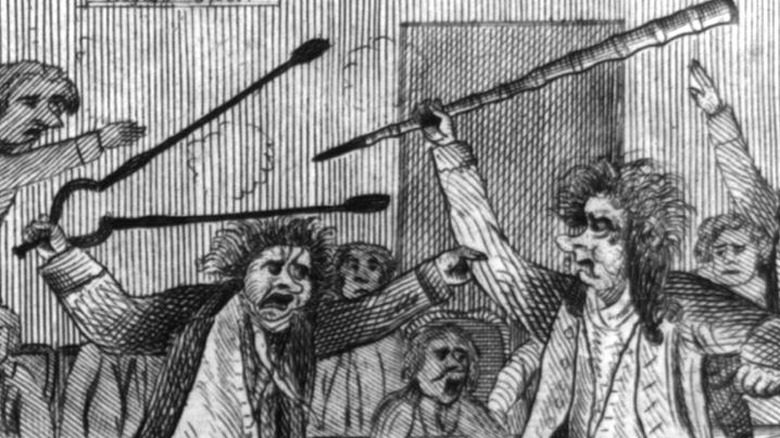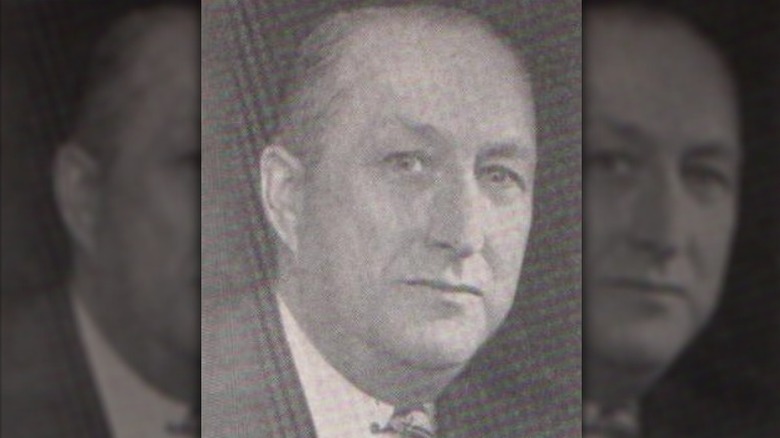Convicted Felons Who Have Run For Federal Office
Can a person convicted and sentenced to a prison term run for high office in the United States? It's not a question that has traditionally demanded too much attention in the press and public discourse. But Donald Trump has kept the subject in the news. His legal woes before, during, and after his time in the White House bred speculation on what would happen if he was indicted or convicted. With Trump having announced a bid for a 2024 political comeback while facing possible indictment, a fresh round of articles, as exemplified by this Politico piece, has wondered about the potential impact of the latter development on the former.
The short answer is, there wouldn't be one — or at least, not immediately. PolitiFact lays out the criteria for running for president: natural-born U.S. citizenship, residency in America for at least 14 years, and at least 35 years of age. Except for a prohibition on insurrectionists or seditionists running for office, there's nothing to keep someone accused or even convicted of crimes from mounting a campaign, or serving if elected. While the exact requirements differ when it comes to Congress, there's the same absence of a rule against felons running and serving (per PolitiFact). States may set stricter rules for their own offices, but they have no say on the federal level. And many candidates with convictions to their name have run before Trump. Some have even made it into office.
Eugene V. Debs
He never came close to the White House in any of his five runs for president and is little-known today, but Eugene V. Debs made quite a splash in American politics in the early 20th century. A devoted union organizer, Debs was arrested for participating in the Chicago Pullman Palace Car Company strike (per Britannica). While serving his prison sentence, he became attracted to the philosophy of Karl Marx and the agrarian Populist Movement that developed in America in the 1890s. In 1900, Debs founded the Socialist Party of America.
Debs was his party's candidate for president in 1900, 1904, 1908, and 1912. According to The Washington Post, he was well aware that he didn't have a hope of reaching high office under the two-party system. But the campaigns helped Debs to raise awareness of the challenges faced by working class people, and his uniquely American presentation of socialism attracted many listeners. As a result, Debs won a greater share of the popular vote with each election.
Debs was an outspoken opponent of America's entry into World War I, which led to charges of sedition. While there were widespread protests against the war, a backlash targeted socialists and other left-wing groups for encouraging draft resistance. Debs proudly admitted to opposing the war and was convicted, sentenced to 10 years, and disenfranchised in 1918. He still ran for president in 1920, winning over 913,000 votes. His sentence was commuted in 1921.
Corrine Brown
Corrine Brown had already achieved federal office when she faced legal trouble. She was elected to 12 consecutive terms between 1993 and 2017 per the House of Representatives History, Art and Archives. But in 2017, Brown went to trial on charges of tax fraud. It was alleged that she had used a fake charity, One Door for Education, for her own ends, and solicited letters from various organizations as cover during an IRS audit (per News 4 Jax).
Brown was convicted of 18 counts of fraud and sentenced to five years, but the COVID-19 pandemic saw her win an early release on humanitarian grounds. More specifically, being in her 70s, it was decided that keeping her incarcerated posed an undue risk to her health. Brown's lawyers then moved for a retrial, but in May 2022, she entered a plea deal, admitting to one count of fraud. The terms of her plea included a time-served sentence of 32 months and over $62,000 paid to the IRS.
Despite the admission, Brown launched a campaign to win the Democratic nomination for Florida District 10, representing west Orlando (per News 4 Jax). She placed fourth in the primary, losing to Maxwell Alejandro Frost. That said, Brown told News 4 Jax she didn't think her conviction mattered one way or the other and refused to rule out future political activity.
Lyndon LaRouche
Some men are real-life Don Quixotes, chasing after impossible dreams in the face of perpetual and inevitable defeat. Their motives, however, might not be so noble as a country squire attempting to revive chivalry. Lyndon LaRouche, who passed away in 2019 per his NPR obituary, was a perennial presidential candidate between 1976 and 2004. His positions and political affiliations made some wild swings over the years. Initially running for the Labor Party, he later competed in Democratic primaries, and seen in his early days as left wing, he was later labeled far right. He even claimed that Queen Elizabeth II was involved in drug trafficking and that jazz music was created by white people to enslave Black people, and he faced accusations of various forms of bigotry.
The Heritage Foundation estimated LaRouche's support base was between 1,000 and 3,000 people in 1984. His inner circle were seen as conspiracy theorists, as LaRouche himself was often regarded. His biographer, Dennis King, held him up as a cautionary example of right-wing extremism. But such assessments didn't deter LaRouche from running. Nor did a conviction in 1988 for tax and mail fraud, which he later dismissed as politically motivated. He received five years for the charges and ran his 1992 bid for president from behind bars.
After his last campaign in 2004, LaRouche continued to weigh in on American politics with bizarre ideas. In 2016, he argued that Britain, not Russia, was interfering in U.S. elections.
Keith Judd
The U.S. presidential primary system can offer some unusual characters time in the national spotlight. As the incumbent president ahead of the 2012 election, Barack Obama faced no serious opposition during the primaries and remained the Democratic candidate. But he did see a slight hiccup in West Virginia, courtesy of one Keith Judd.
Judd, according to the Dallas Morning News, was sentenced to over 17 years in prison for making threats in 1997. He maintained his innocence, insisting that a divorce case was used to target him over politics. Thousands of lawsuits followed, nearly all of them dismissed, though that wasn't the end of his issues. His prolific litigations led to a ban against Judd in the U.S. 5th Circuit. But while suing and serving time in Texas, Judd's name nonetheless made it onto Democratic primary ballots in West Virginia, and he took over 73,000 votes — 40% of the primary total.
Professor Robert Bastress of West Virginia University told the Morning News that Judd's strong showing had less to do with him than Obama; Bastress doubted most voters even knew who Judd was. But economic woes, Obama's stated opposition to coal power, and racism among certain voters led to widespread frustration with the administration in West Virginia, making Judd an easy protest vote. Released in time for 2016, Judd mounted a somewhat more serious campaign in that year's primary in several states, but per AP, he didn't get a single percentage point.
Edwin Edwards
Donald Trump's infamous boast that he could shoot someone on Fifth Avenue in New York and still win the presidency (via NPR) isn't the only such display of bravado by an American politician. In their obituary for Louisiana governor Edwin Edwards, the New York Times quoted his claim that he would never be defeated unless "caught in bed with either a dead girl or a live boy." Sex and murder did not derail Edwards' political fortunes, in fact, but crooked casino dealings did.
Before being convicted of racketeering in 2000, Edwards was Louisiana's only four-term governor. He first took the office in 1972, and while the state constitution forbids governors from serving more than two consecutive terms, spacing out his wins let Edwards have 16 years in office. He didn't smoke or drink, he quoted the Bible, and he appealed to working class and minority voters. But at the same time, he was also open about his womanizing and carried a whiff of corruption well before he was sent to prison. Supporters acknowledged his scandals but admired his openness about them.
Edwards served eight of the 10 years on his sentence. Not long after his release, he even attempted to win federal office. Having served in Congress before becoming governor, he tried to take a seat in the House again in 2014. He made it as far as a runoff election but lost to Garret Graves. Edwards died of respiratory failure in 2021 at age 93.
Jason Mariner
When it comes to Congress, the U.S. Constitution (via PolitiFact) specifies that candidates must live in the state they're running to represent, have at least seven years' citizenship, and be at least 25 years old to qualify. Felonies can't keep a name off the ballot, and states can't set additional requirements for federal office. But states can establish stricter rules for state office, and as a result, state constitution rules regarding prisoners' rights can complicate runs at the federal level.
Jason Mariner served two years on charges ranging from resisting arrest to cocaine possession (per the Tampa Bay Times). He ran in the Republican primary for Florida's 20th congressional district in 2021 and won with 58% of the vote. But under Florida state law, in order to hold public office, felons must go through a formal process to restore certain civil rights forfeited during incarceration. Mariner admitted that he never went through the process, and a Bay Times investigation found no record that he had cleared that particular legal hurdle.
Still, Mariner maintained that he was a legal, qualified candidate. And press secretary Christine Pushaw further conceded that state government lawyers were unsure if Florida's rules regarding the restoration of felons' rights could have a bearing on candidates for federal office. He was allowed to run in a special election to replace the deceased congressman Alcee Hastings, but ultimately, he lost to Democratic candidate Sheila Cherfilus-McCormick (per WUFT).
Greg Gianforte
In 2017, Montana held a special election to fill its sole congressional seat. The day before voting began, according to the New York Times, Republican candidate Greg Gianforte was interviewed by Ben Jacobs, a reporter for the Guardian. When Jacobs put a question to him about the healthcare bill advanced by House Republicans, Gianforte got physical. Jacobs alleged that the candidate punched him, broke his glasses, and injured his elbow. Despite that, Gianforte narrowly won the next day, but he went into office facing misdemeanor charges.
Per ABC News, Gianforte pled guilty. The sentence was light: 40 hours of community service, 20 hours of anger management training, and the possibility of having the charge dismissed if he fully complied (per the Times). Gianforte publicly apologized to Jacobs, who issued a statement in support of the ruling. Some spectators, however, felt the sentence fell short of the crime, which critics connected to a perceived growing tide of hostility toward reporters in the wake of Donald Trump's rhetoric against the press.
Gianforte ran again in 2018, during the regularly scheduled congressional election. Trump accompanied him on some campaign events and took advantage of the chance to reference the incident with Jacobs. "Anyone who can do body slam, that's my kind of guy," he said (per CNBC). Despite the misdemeanor, and the specter of endangering the First Amendment, Gianforte retained his seat.
Ted Stevens
At the time of his conviction, Ted Stevens was the longest-serving Republican in the U.S. Senate (per CNN). He was first elected by Alaska in 1968, and he kept winning reelection until 2008. But all was not well. That was the year he went to trial on multiple corruption charges. The prosecution argued that Stevens had accepted gifts and home renovations from the oil industry services company VECO Corp and lied about them on mandatory ethics forms.
Stevens maintained his innocence, sought to have the case thrown out, and accused the Department of Justice of prosecutorial misconduct. There was at least one instance of evidence showing the opposite of a claim made by the indictment, and the case saw several issues with its jurors. But the trial went forward, and Stevens was found guilty on all counts. Even Sarah Palin, then governor of Alaska and John McCain's running mate, pointed to Stevens as a cautionary tale of the level of corruption inflicted on the state by oil companies.
At the same time he was fighting in court, Stevens was fighting at the ballot box. He ran a close race against Mark Begich for his Senate seat, but ultimately lost (per CNN). But some relief came for him the following year; after credible accusations of misconduct from a whistleblower, Stevens' conviction was set aside.
Matthew Lyon
The idea that even those with a criminal record can hold high office in America saw an early test in the nation's history. Matthew Lyon came to the then-colonies as an indentured servant in 1765, per the House of Representatives' History, Art & Archives. He fought in the Revolutionary War on the side of the colonists; when he was dishonorably discharged, he stayed in service as a scout. When the war finished and the colonies became the United States, Lyon became one of the founders of Vermont, and he later became its representative in the House.
Lyon was closely allied with Thomas Jefferson and his Democratic-Republican party and founded a partisan newspaper to support their policies. During the presidency of Federalist John Adams, Lyon was outspoken against the administration and Adams personally. A particularly acidic creed against the president, published in the Vermont Journal in 1798 (per Politico), led to Lyon becoming the first person jailed under the Federalists' controversial Sedition Act.
Lyon became an early martyr for free speech after the arrest, but Vermont reelected him while he sat in jail. In the election of 1800, Lyon opted not to run again, but he was still seated when the presidential election was thrown to the House. Lyon cast Vermont's vote for Jefferson. Two years later, having moved to Kentucky, he returned to the House as a representative for that state, one of the few congressmen to have served in two state delegations.
Thomas J. Lane
In 2009, the Boston Globe reported that city councilor Chuck Turner was reelected with over 58% of the vote, despite facing a federal indictment for corruption. The Globe used Turner's city-level victory to reflect on the long history of candidates prevailing in Massachusetts despite facing criminal charges. Among their named examples was one at the federal level: Thomas J. Lane, who served on the Massachusetts delegation in the House of Representatives in the mid-20th century.
According to the House's History, Art & Archives, Lane, a son of Essex County, was first elected to Congress in 1941. He had won seven terms when, in 1956, he faced charges of income tax evasion (to the tune of tens of thousands of dollars). Kim Long's "The Almanac of Political Corruption, Scandals, and Dirty Politics" says that Lane was convicted and sentenced to four months and a $10,000 fine; the Globe reported that he pleaded guilty. Either way, after serving his four months, Lane ran for an eighth term, and he got it. He remained in Congress until 1963, when he finally lost a race. That loss didn't spell the end of Lane's political career, though; rather, he became a member of the governor's council for the commonwealth in 1965, a position he held for five years.
